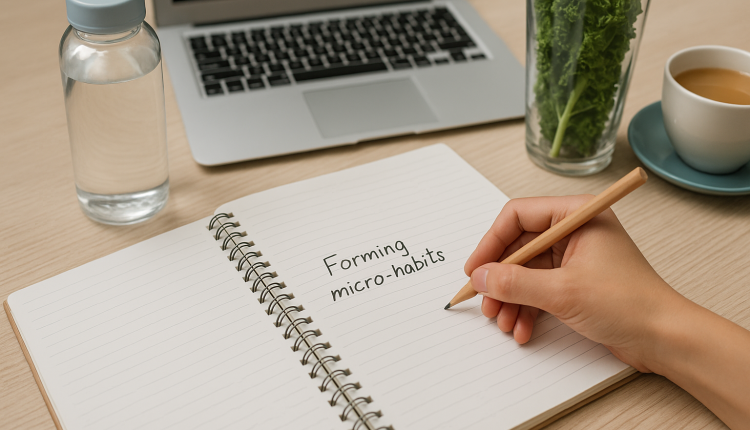In a world filled with complex health advice and overwhelming wellness trends, the idea of radically changing your lifestyle overnight can feel impossible. And often, it is. While the internet is brimming with tips to “lose 10 pounds in a week” or “completely transform your body in 30 days,” most people don’t need — or want — a complete overhaul. They need something smaller, sustainable, and real. This is where the concept of micro-habits comes in.
Micro-habits are tiny, intentional actions that require little effort but, when done consistently, can produce long-term changes in health, mindset, and overall well-being. Think of them as the compound interest of self-care: individually minor, but collectively transformative.
Why Big Goals Often Fail
Before diving into the power of micro-habits, it’s important to understand why so many health goals fall apart. We set unrealistic expectations. We join gyms and never go. We buy blenders, detox kits, yoga mats — all with the belief that motivation will carry us. But motivation is fleeting. Real change comes from repetition.
Big lifestyle shifts often fail not because the goal is unworthy, but because the pathway is too steep. When we rely solely on motivation or willpower, we exhaust ourselves. The key is to lower the barrier to entry — and that’s exactly what micro-habits do.
What Makes a Micro-Habit?
A micro-habit is:
- Small enough to feel easy
- Tied to an existing routine
- Not reliant on motivation
- Immediately achievable
Examples include:
- Drinking a glass of water right after brushing your teeth
- Doing 10 squats before stepping into the shower
- Stretching for 2 minutes when you first get out of bed
- Taking three deep breaths before checking your phone
- Writing down one thing you’re grateful for at night
These actions take less than a minute, but they carry a psychological impact. They build identity. When you do a healthy thing — even a small one — your brain registers you as someone who prioritizes well-being. That’s powerful reinforcement.
The Health Benefits You Might Not Expect
While a single micro-habit may seem too minor to matter, research in behavioral psychology shows that the brain rewards consistency over intensity. When you repeat an action in the same context, it starts to become automatic. And when multiple micro-habits stack up, they often snowball into more significant health improvements.
For example:
- Improved digestion from consistent hydration
- Better posture from daily micro-movements
- Enhanced mental clarity from short mindful pauses
- Reduced stress through tiny breathing rituals
- More restful sleep from intentional evening cues
The key is not doing more, but doing just enough — daily.
How to Start Your Own Micro-Habit Routine
- Identify a Cue: Anchor your micro-habit to an existing part of your day. For example, after you pour your morning coffee, you do 5 stretches.
- Make It Frictionless: If it feels like work, it’s too big. Shrink the action until there’s zero resistance.
- Track Without Obsession: Use a habit tracker, a sticky note, or a simple checkmark. Visual cues keep you engaged.
- Celebrate Immediately: A fist bump, a smile, or a mental “well done” helps reinforce the behavior neurologically.
- Stack Over Time: Once a micro-habit becomes effortless, you can layer a second one. Over months, this creates a ripple effect.
Common Myths About “Doing Too Little”
There’s a tendency to dismiss small habits as ineffective. But in reality, most long-term success stories — whether it’s weight loss, stress reduction, or better sleep — begin with one small decision, repeated consistently.
Micro-habits bypass our inner resistance. They don’t require perfection. And because they fit seamlessly into our lives, they are far more likely to last.
Real-Life Micro-Habit Examples You Can Try Today
- Keep a water bottle on your desk and take one sip every time you send an email
- Stand up and stretch for 30 seconds every time you finish a Zoom call
- Turn off your phone for the last 10 minutes before bed
- Put a book on your pillow as a cue to read one page before sleep
- Do one deep exhale every time you sit down in a chair
Final Thoughts
You don’t need a new version of yourself — just a slightly better one. And that version is built by what you do daily, not occasionally.
A healthy lifestyle isn’t a sprint. It’s not even a marathon. It’s a gentle, winding walk made up of small, repeated steps — the kind that don’t feel like work at all. If you’ve ever struggled to stick with healthy routines, stop aiming for drastic and start aiming for doable.
Your health is not a grand transformation. It’s a quiet accumulation. And it starts now — with one small step.


